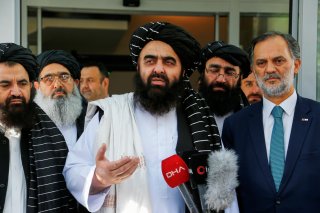United Nations Relationship With the Taliban Remains Murky
While there is broad support for a continued UN presence in Afghanistan, observers have questioned how Western nations can cooperate with the Taliban-led government.
The UN Security Council adopted a resolution on Thursday to return the UN Assistance Mission in Afghanistan (UNAMA) to the country for an additional year, although it left the status of its relationship with Afghanistan’s new Taliban-led government unresolved.
The resolution did not reference either the “Taliban” or the “Islamic Emirate of Afghanistan,” the Taliban’s official name for the country. Instead, it emphasized the humanitarian benefits of UN operations within Afghanistan, which it said are vital to continued peace in the country. Fourteen of the fifteen UNSC members voted in favor of the resolution, while Russia—currently embroiled in a diplomatic crisis with most of the other members over its ongoing war in Ukraine—abstained.
The UNSC’s resolution “decided that the Mission will focus on several key activities, including coordinating the provision of humanitarian assistance and the delivery of basic human needs; providing outreach and good offices for dialogue between Afghan stakeholders and the international community; and promoting good governance and the rule of law,” according to a readout of the meeting posted to the UN’s website.
Norway’s UN Ambassador, Mona Juul, told reporters after the vote that UNAMA’s new mandate was “crucial not only to respond to the immediate humanitarian and economic crisis, but also to reach our overarching goal of peace and stability in Afghanistan.” “UNAMA has a crucial role to play in promoting peace and stability in Afghanistan and to support the Afghan people as they face unprecedented challenges and uncertainty,” she said.
While there is broad support for a continued UN presence in Afghanistan—a presence that Taliban leaders have largely welcomed—observers have questioned how Western nations can cooperate with the Taliban-led government, which remains under international sanctions and has been credibly accused of human rights violations, both before its conquest of Afghanistan in August 2021 and after. Several members of the Taliban’s government, such as Interior Minister Sirajuddin Haqqani, are wanted by the U.S. government on charges of terrorism; in spite of his new position, Haqqani has an active $10 million bounty on his head.
In the days following the Taliban takeover, the group’s spokesmen promised the international community that it intended to rule Afghanistan peacefully and would not seek retribution against members of the previous government or its armed forces. The spokesmen also indicated that they would seek to form a government representative of all Afghans.
So far, the Taliban’s record on these promises has been mixed. The group’s government included members from several of Afghanistan’s ethnic groups but excluded women and Hazaras, a Shi’a ethnic group targeted by the Taliban in the past. There have also been documented cases of retribution killings against the Taliban’s prior enemies, although it is unclear whether these killings were ordered by the group’s leadership or by individual commanders.
Trevor Filseth is a current and foreign affairs writer for the National Interest.
Image: Reuters.

